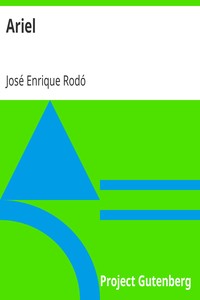Ariel by José Enrique Rodó
"Ariel" by José Enrique Rodó is an essay published in 1900. This brief philosophical work addresses Latin American youth through symbolic characters from Shakespeare's "The Tempest." Rodó warns against utilitarianism and "nordomania"—the imitation of North America—urging young people to preserve their spiritual values and cultural identity rooted in classical Greek ideals and Christianity. The essay critiques U.S. cultural dominance following the Spanish-American War and advocates for authentic democracy through education rather than
material pursuit. (This is an automatically generated summary.)
Read or download for free
| How to read | Url | Size | |||
|---|---|---|---|---|---|
| Read now! | https://www.gutenberg.org/ebooks/22899.html.images | 184 kB | |||
| EPUB3 (E-readers incl. Send-to-Kindle) | https://www.gutenberg.org/ebooks/22899.epub3.images | 126 kB | |||
| EPUB (older E-readers) | https://www.gutenberg.org/ebooks/22899.epub.images | 128 kB | |||
| Kindle | https://www.gutenberg.org/ebooks/22899.kf8.images | 217 kB | |||
| older Kindles | https://www.gutenberg.org/ebooks/22899.kindle.images | 207 kB | |||
| Plain Text UTF-8 | https://www.gutenberg.org/ebooks/22899.txt.utf-8 | 177 kB | |||
| Download HTML (zip) | https://www.gutenberg.org/cache/epub/22899/pg22899-h.zip | 124 kB | |||
| There may be more files related to this item. | |||||
Similar Books
About this eBook
| Author | Rodó, José Enrique, 1871-1917 |
|---|---|
| Title | Ariel |
| Note | Wikipedia page about this book: en.wikipedia.org/wiki/Ariel_(essay) Wikipedia page about this book: es.wikipedia.org/wiki/Ariel_(ensayo) |
| Credits |
Produced by Juliet Sutherland, Chuck Greif and the Online Distributed Proofreading Team at www.pgdp.net |
| Reading Level | Reading ease score: 26.2 (College graduate level). Very difficult to read. |
| Language | Spanish |
| LoC Class | PQ: Language and Literatures: Romance literatures: French, Italian, Spanish, Portuguese |
| Subject | Democracy |
| Subject | Social ethics |
| Category | Text |
| EBook-No. | 22899 |
| Release Date | Oct 5, 2007 |
| Copyright Status | Public domain in the USA. |
| Downloads | 335 downloads in the last 30 days. |
| Project Gutenberg eBooks are always free! | |

